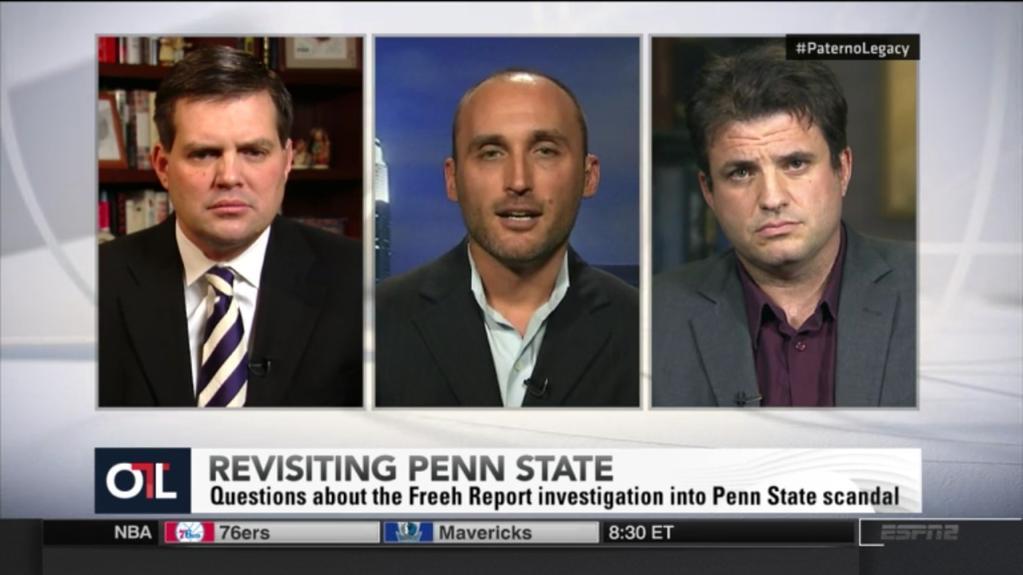ESPN’s Outside The Lines Discusses Paterno Legacy

ESPN’s Bob Ley hosted a panel on the network’s news show “Outside the Lines” on Wednesday night to discuss the legacy of the late Joe Paterno.
The conversation began by highlighting the recent revelations of internal NCAA emails released as part of of Senator Jake Corman’s lawsuit that show the NCAA questioned its own authority to sanction Penn State, as well as evidence that the NCAA was in regular communication with the supposedly independent Freeh group during the Penn State investigation.
Jay Paterno then was asked to weigh in with a simple question: What does the Paterno family want?
“We want the truth and that’s all we’ve ever maintained from day one,” Paterno said. “Because of the litigation on a lot of different fronts that’s facing the NCAA, they’re now being forced to produce documents and we’re starting to get the truth and see that the story they put out initially is not what really happened.”
Paterno refused to speculate on the motivations of the NCAA, but said his father’s legacy is being looked at a second and third time as people begin to question the evidence and conclusions arrived in the investigation about Joe Paterno. He called the coordination between the NCAA and Louis Freeh a “results-based” investigation from early on.
Paterno said he felt there was a false narrative being put out to the public by the university following the Freeh report’s release, and recalled watching Mark Emmert on Outside the Lines talking about how Penn State had lost sight of their core values, and how the NCAA decided to sanction the university based on evidence in the Freeh report.
“When you look at what’s happened since, and you’ve seen what’s been revealed, you realize it was the NCAA that lost sight of their core values,” Paterno said. “If there’s a culture problem, it lies with the NCAA, and not with Penn State football.”
When asked who should bear the responsibility for allowing Sandusky’s crimes, Paterno said it was Sandusky alone. “As anybody in law enforcement will tell you, these people are very good at concealing their crimes,” he said. “And there were a lot more people with more training on how to identify these crimes than we were, and they missed it.”
Paterno’s message was reiterated by Dave Zirin, sports editor for The Nation, a weekly progressive magazine dedicated to politics and culture, and head of a blog named Edge of Sports. Zirin said the issue of the culture of football extends far beyond Happy Valley to universities in other parts of the country like Notre Dame, Alabama, and Florida State. When a football program becomes the cultural, psychological, and economic pulse of an entire region, it can put the value system out of whack. That being said, Zirin pointed to issues of cheating and improper benefits as issues within the boundaries of NCAA jurisdiction, but pointed to the Sandusky scandal as well outside their reach.
“I think the Freeh Report took it way too far when they indicted the community of Happy Valley and State College for what Jerry Sandusky did,” Zirin said. “It is a monstrous thing to hold a community accountable for serial child rape.”
“Just because you have a Penn State decal means you’re somehow complicit in what Jerry Sandusky did is not only a bridge too far, but it’s profoundly irresponsible by Louis Freeh and all the people pushing that narrative,” he added.
Zirin appears to be one of many folks to change their opinion on the Freeh report and Penn State’s culture since the initial tidal wave hit Happy Valley. These were his words back then.
Bob Ley asked Paterno to discuss whether his father’s standing as one of the most prominent, if not most powerful, men in the commonwealth impacted the the way the issue was dealt with over the last 14 years. Paterno said only two incidents were ever brought to the attention of anyone in the university’s athletic department, and both were reported to someone outside the university.
“The culture we had for student athletes at Penn State was a student-athlete, welfare centered program that did what was right for young people,” Paterno said.
Zirin countered with a point illustrating that Joe Paterno was a victim of the great reputation he had built. Paterno did what was legally required of him by calling his superiors, but said “when your name is on the library, when your statue is on campus, when you’re this avatar of everything that’s good, people expect you to do more.”
In Joe Posnanski’s biography of Paterno, he quotes the late coach as saying “with the benefit of hindsight, I wish I had done more.”
“And what human being wouldn’t say that?” Jay Paterno said. “We simply didn’t know what we were dealing with, and it’s very easy to judge people’s actions in 2001 based on what we know in 2014.”
Jay Paterno also mentioned how it would have been illegal for his father to follow-up with the investigation, according to Pennsylvania law.
“He did not just do what was legally required of him, he did the maximum of what he was allowed to do at that time,” Paterno said. “And the argument that he had some sort of supernatural power? Whether he won zero games or 409 games, he was a citizen equal under the eyes of the law.”
Your ad blocker is on.
Please choose an option below.
Purchase a Subscription!




